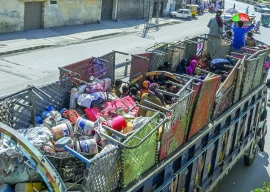
However, Pakistan, being the third biggest milk producer, has not been able to make a significant impact in the processed industry. As per the statistics provided by Tetra Pak Pakistan, the total milk production of Pakistan currently stands at 39.5 billion litres out of which the share of processed industry is a mere 1.71 billion litres.
“This figure makes the share of ambient dairies in the total processed milk to around 5.56%, however, if we include chilled and milk powder then the share increases to around eight percent,” said Tetra Pak Pakistan Director Marketing Assad Abbas in an interview with The Express Tribune.
Out of the 39.5 billion litres of total production, available milk for commercial usage is 23.7 billion; this figure also includes imported milk powder. However, the major chunk out of this milk - 19.2 billion litres - goes unprocessed.
Being the third largest milk producing country, Pakistan should start documenting the animals, said Abbas.
In the US, total number of milk-giving animals is 3.9 million, however, smart dairy farming helped the country produce 52 billion litres of milk annually. In Pakistan, the total number of animals is around 52 million and the total milk production is 39.5 billion litres, data shows.
“All animals in the US are tagged and economic managers monitor the requisite data. In Pakistan, animal tagging has just begun in corporate farming but a lot of work needs to be done in terms of educating the medium and small scale dairy farmers,” he said.
Also, Pakistan needs to preserve the 6.7 billion litres of milk wasted annually due to the poor supply chain network.
Tetra Pak’s performance
The company has a major share in the overall milk packaging segment, but it also has increased its footprint in more than 10 countries in recent years.
The company though refused to share the financials, but industry experts said that its current share in Pakistan is around 90%, consisting of 20 different packaging solutions. According to Abbas, “Out of the total production at the Lahore factory, one-fourth of the packs are exported to East African, Middle Eastern, and Central Asian countries, contributing a handsome share in terms of foreign exchange.”
The company’s total production capacity currently stands at 8 billion packs annually which could be enhanced to 9 billion. The company, if need be, is prepared to double its production capacity to 16 billion packs.
Published in The Express Tribune, September 6th, 2015.
Like Business on Facebook, follow @TribuneBiz on Twitter to stay informed and join in the conversation.

1722325927-0/BeFunky-collage]-(97)1722325927-0-270x192.webp)
















COMMENTS
Comments are moderated and generally will be posted if they are on-topic and not abusive.
For more information, please see our Comments FAQ